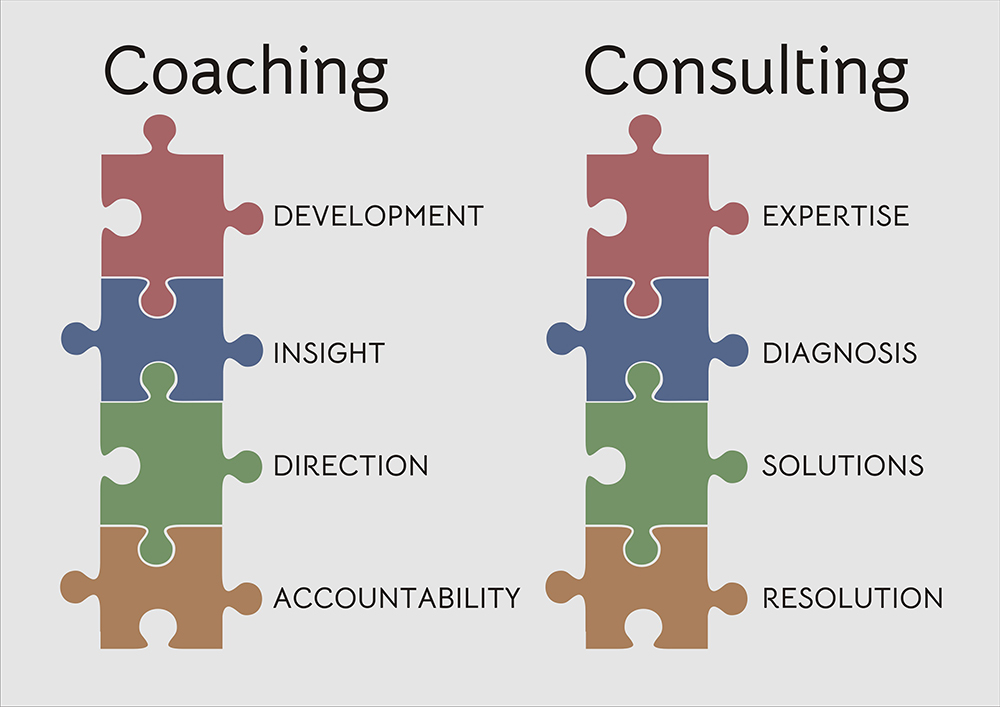Coach & Consult
The Intent
To help solve the problem or challenge in order to move forward.

Coaching skills primarily focus on personal development, helping individuals to unlock their potential through empowerment, increased self-awareness, and accountability. These skills enable sustained personal and professional growth by fostering a deeper understanding of one’s motivations and behaviours.
On the other hand, Consulting skills are centred around providing expert advice and practical solutions to specific problems. Consultants bring specialized knowledge and an objective perspective, which is crucial for tackling complex challenges, enhancing efficiency, and implementing effective strategies within an organization.
Together, Coaching & Consulting skills offer a holistic approach that not only addresses individual development needs through coaching but also meets organizational challenges with consulting. This combination ensures both personal and business environments can thrive, achieving goals through tailored, strategic support.

Leadership
Leadership is not just about holding a title or being number one in the team. True leadership is about treating everyone as number one and leaving a positive impact that extends far beyond the workplace. It's about understanding core values and combining them with the right mindset and skills.
Leadership isn't easy; it's messy and complex. Leader experiences the contradictions and challenging emotions firsthand. But despite the challenges, he believes in the power of effective leadership to inspire and empower others.
Empathy and emotional intelligence are paramount in effective leadership. They allow to connect deeply with others, inspire them, and foster a culture of trust and collaboration.
Change is inevitable, and a leader navigates it wisely. Leader understands the importance of making informed decisions and prioritizing effectively. Delegation is key, but so is empowering the team to take ownership and grow. Moreover, leader recognizes the importance of fostering accountability and innovation within the team.
Leader strives to lead by example, embracing a growth mindset and tackling complexities with simplicity. Additionally, he prioritizes personal and team growth, recognizing that continuous learning is essential for success.
Communication lies at the heart of leadership. It's not just about talking; it's about listening and asking the right questions. Leader strives to create a collaborative environment where feedback is valued, and everyone feels heard and appreciated.
Ultimately, leadership is about more than just leading; it's about inspiring, engaging, and appreciating those around me. Leader dedicates to continuous growth and learning, knowing that effective leadership is a journey, not a destination.
Strategy
Strategic thinking is identified as a key driver of innovation, requiring a blend of creativity, foresight, and a willingness to challenge the existing norms. The notion of "Soulful Strategy" brings to light the importance of embedding social values within strategic planning, ensuring that strategies resonate on a deeper level with those who are tasked with implementing them.
Exploring a variety of strategic frameworks is essential for identifying the most effective path forward. Organizations should assess their current strategic posture and be open to adapting new methodologies that better suit the evolving market and organizational dynamics.
Action steps for companies include a thorough evaluation of their strategic approach and a conscious move towards methodologies that promise greater efficacy. This could mean adopting strategies that are more inclusive, adaptable, and aligned with the company's core values and culture. Such alignment is crucial, as it strengthens the brand identity and fosters a sense of ownership among teams.
The execution of strategy is underscored as a paramount challenge, often more difficult than the strategy formulation itself. Execution requires a clear understanding among all organizational members and a commitment to see the strategy through.
To summarize, the emphasis is on the dynamic interplay between strategic creativity, practical planning tools, cultural alignment, and the execution of strategies. Organizations should foster a strategic culture that values adaptability, inclusivity, and alignment, ensuring that strategies are not only designed to navigate the future but are also deeply rooted in the organization’s social fabric and capable of being executed successfully in the face of evolving market challenges.
